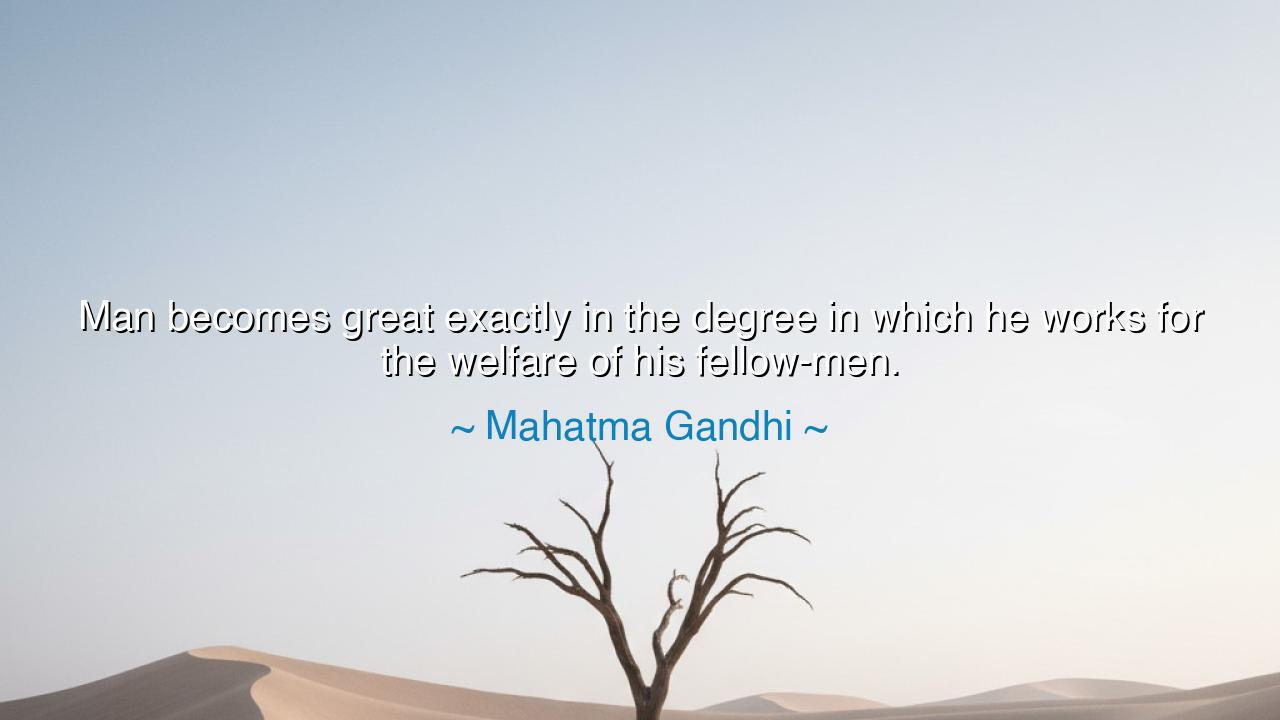
Man becomes great exactly in the degree in which he works for the
Man becomes great exactly in the degree in which he works for the welfare of his fellow-men.






“Man becomes great exactly in the degree in which he works for the welfare of his fellow-men.” Thus spoke Mahatma Gandhi, the humble sage of India, whose greatness was not born of power, but of service. In this saying lies a truth as ancient as humanity itself: that true greatness is not measured by dominion, wealth, or fame, but by the measure of one’s compassion and labor for others. The heart that beats for the world beats with divine rhythm, and the hands that toil for the good of mankind are the hands that touch eternity.
To understand Gandhi’s words, we must first understand the world in which he lived. India, shackled beneath the weight of colonial oppression, was a land divided by caste, creed, and fear. Yet in the midst of this darkness arose a man clothed not in silks but in simplicity, armed not with sword or throne but with truth and love. Gandhi worked not for his own honor but for the upliftment of the poor, the freedom of the enslaved, the dignity of all. In him, the ancient wisdom of the East found a new voice — that to serve humanity is to serve God, and that the measure of a man’s worth is the measure of his selflessness.
The origin of this quote is rooted in Gandhi’s lifelong philosophy of sarvodaya, meaning “the welfare of all.” He believed that the greatness of an individual, a nation, or a civilization is revealed not in what it gains, but in what it gives. A life lived only for oneself is a small and fading flame; but a life lived for others becomes a torch that lights the way for generations. For Gandhi, every act of compassion — teaching a child, tending a wounded soul, lifting a burden from another’s back — was a sacred offering, a step toward moral greatness.
Consider the story of Florence Nightingale, the Lady with the Lamp, who walked the blood-soaked corridors of war to tend to the dying. In the cold and chaos of the Crimean nights, she asked no reward but the peace of those in her care. Her hands, calloused by labor, became instruments of mercy. Her fame came not from desire, but from devotion — and thus, she fulfilled Gandhi’s truth centuries before he spoke it: that the light of greatness shines brightest in the heart that seeks to heal the world.
Contrast this with the rulers and conquerors of history, who built their monuments upon the suffering of others. Their empires have fallen, their names eroded by time, for they labored not for the welfare of mankind, but for their own ambition. But those who serve — the teachers, the healers, the reformers, the martyrs — their memory endures like the fragrance of a flower long after it has faded. Greatness built upon love is eternal; greatness built upon power is fleeting.
Yet Gandhi’s words also contain a challenge. To work for others is not an easy path. It demands sacrifice, humility, and the courage to see oneself as part of a greater whole. It means silencing the voice of pride that asks, “What do I gain?” and instead listening to the higher call that asks, “What can I give?” The one who labors for humanity may find no riches, no applause — but he finds peace. And in that peace lies the crown of the truly great.
So, my children, if you would seek greatness, seek it not in the heights of power but in the depths of service. Look around you — the weary, the forgotten, the voiceless — and ask how your hands may lighten their load. Give, not because you are rich, but because you are human. Love, not because the world demands it, but because your soul cannot live without it. In serving others, you will find yourself; in losing yourself for their sake, you will discover what it means to be immortal.
For as Gandhi taught, man rises in stature only when his heart stoops in kindness. The path of greatness is paved with acts of mercy, the quiet deeds unseen by the world but witnessed by heaven. Let your life, then, be not a monument of pride, but a river of goodness flowing toward all mankind. For the man who serves all is the man who truly reigns — and in his service, the soul of humanity ascends.






AAdministratorAdministrator
Welcome, honored guests. Please leave a comment, we will respond soon